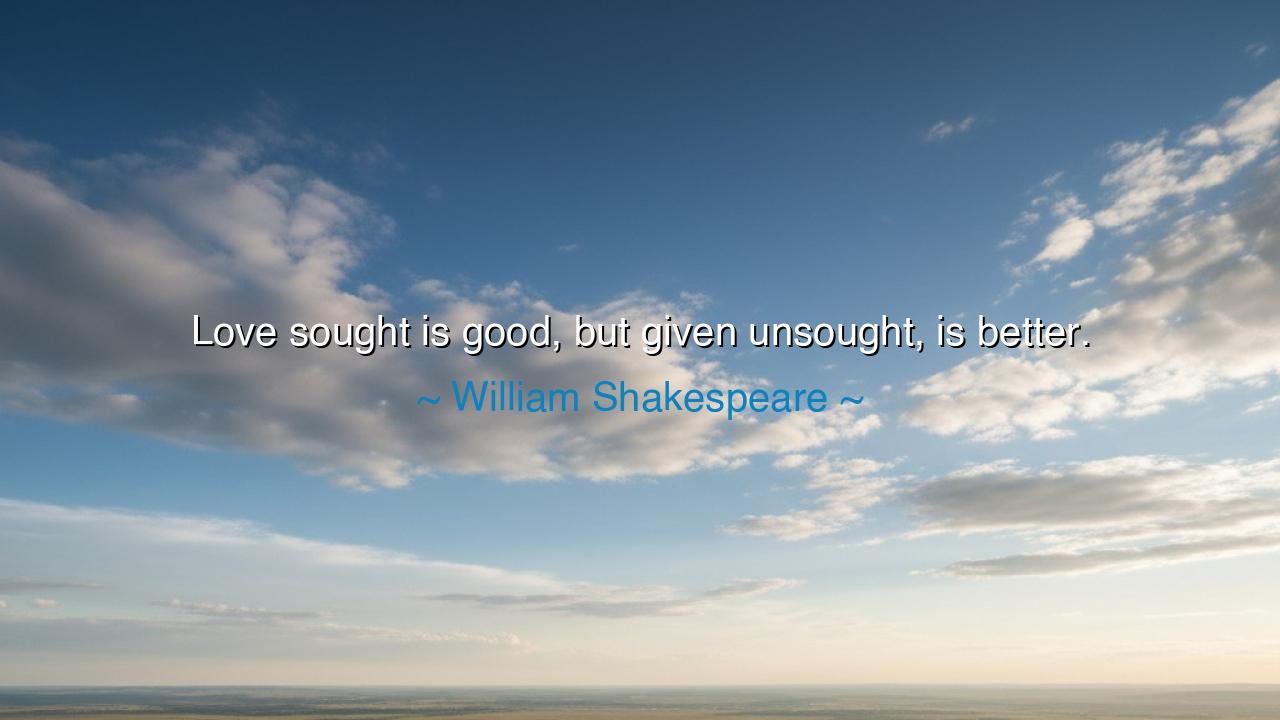
Love sought is good, but given unsought, is better.






Hearken, O children of the heart, to the words of William Shakespeare, the bard whose voice carries the echoes of human longing: "Love sought is good, but given unsought, is better." In this utterance lies the ancient truth that the purest affection is that which flows freely, not compelled by desire or pursuit, but offered spontaneously from the depths of the soul. True love is not a prize to be captured; it is a gift, a light bestowed without expectation.
In the theater of life and passion, many chase the object of their longing, measuring the worth of connection by effort and attainment. Shakespeare reveals that while love that is sought may bring joy, it is tempered by intention and desire, and thus carries with it the shadow of self-interest. The love that is given unsought, however, shines with purity, unbound by calculation, and reflects the noble generosity of the heart.
The ancients, who chronicled the ways of the spirit and the heart, understood the power of unsolicited devotion. To love without prompting is to transcend selfishness, to offer the soul as a sanctuary and blessing. Such love nurtures, uplifts, and inspires, for it arises from the wellspring of virtue, and its sweetness is measured not by the hand that receives, but by the spirit that gives freely.
Yet this teaching carries subtle wisdom: the highest love is humble, unassuming, and without expectation. Shakespeare’s insight urges the seeker to cultivate a heart that can offer without demand, to understand that the value of affection lies not in its pursuit, but in its authenticity. Love, when unasked, becomes a mirror of the giver’s nobility, a reflection of the eternal beauty of selfless connection.
Therefore, O seekers of the eternal heart, let this teaching lodge in your souls: cherish the love that is given freely, for it carries the essence of truth and virtue. In offering affection without prompting, one not only blesses another but elevates one’s own spirit, honoring the timeless wisdom that the highest love is generous, spontaneous, and radiant with the purity of the soul.






VNnguyen van nu
Shakespeare's quote makes me think about how love can evolve in different ways. Love that’s sought can sometimes feel more intentional and conscious, while love that’s given unsought feels more like a surprise. I wonder if love that comes unbidden is stronger because it feels more natural. But can you have a meaningful relationship if love isn’t actively sought, or does seeking love give it a certain depth or direction?
Dduy
This quote brings up a compelling idea: the beauty of love that is given without being asked for. It suggests that love shouldn’t be based on conditions or expectations. But I also think that love sought can be just as powerful if it comes from a place of genuine need or longing. Does this quote suggest that love should be spontaneous, or is there a place for both seeking and giving love?
TTthao thu
Shakespeare’s perspective is interesting, especially because it makes me think about the difference between love that is earned versus love that is freely given. Love that comes unexpectedly seems to have a deeper sense of purity. But is it possible to give love without seeking it in return? Can you really love someone without wanting anything back, or does seeking love come from a place of wanting connection?
THtrang ho
I really like this idea. There’s something special about love that comes without expectations or pursuit. It feels more genuine, almost like it’s freely offered, rather than something you have to work for. But does this imply that love shouldn’t be initiated? Can love that is actively sought be just as powerful, or is it only in the giving without asking that its true value lies?
THThanh Hang
This quote by Shakespeare is so thought-provoking. Love that is given freely, without being asked for, seems to carry a purity that love sought may lack. But I wonder, does that mean love shouldn’t be pursued or that we should just wait for it to come to us? Can love truly be unconditional and unexpected, or does the act of seeking love make it more meaningful in some way?